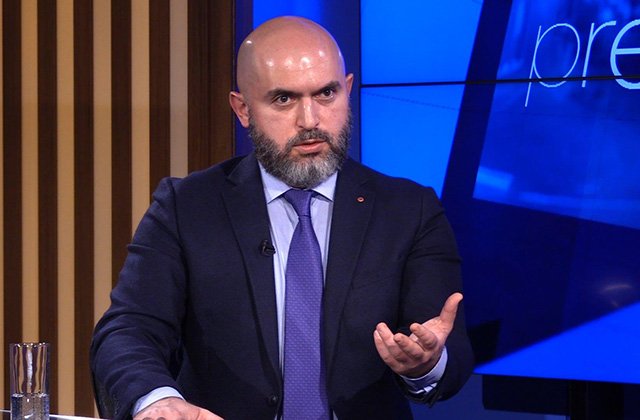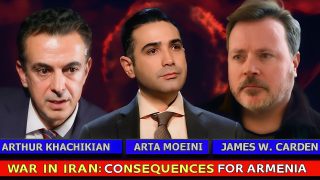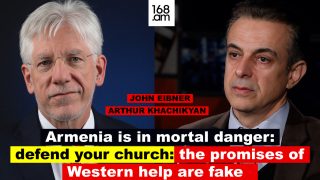Armenia–the illusion of a post-war dilemma

Co-President of the Euronest Parliamentary Assembly, former Prime Minister of the Republic of Lithuania and current Member of the European Parliament Andrius Kubilius recently published an interesting article entitled “Transcaucasia: the Armenian dilemma”. In his article, Kubilius touches upon the third war of Nagorno-Karabakh (hereinafter referred to as Artsakh) and the geopolitical situation created around Armenia. I personally know my colleague. We have interacted several times and exchanged views on various platforms of both Euronest Parliamentary Assembly and the European People’s Party. I thank Mr. Kubilius for his concern about the fate of Armenia, and I am certain that his concern is sincere and that he is interested in the complete solutions to the issues facing Armenia.
However, I have to touch upon the published article since there are a number of major issues that the author has carefully circulated in his article. I will try to present the major issues. Mr. Kubilius presents the vision for relations between Armenia and the European Union (EU), but he fails to answer the main question that concerns the Armenian public, and that question is the following: Where were the EU and the collective West during this war? Like many citizens of the Republic of Armenia, I, as a supporter of the cordial Armenia-EU relations and as a person who has made certain contributions to the development of the bilateral relations, also expected to see the EU take several logical steps during and after the war, but the EU never took those steps during and after the war.
Why did the war end this way? Was there really no way for the EU to take more resolute steps and prevent the disaster that befell the Armenian people? Why did the EU ignore the Armenians at the most difficult moment? I understand the geopolitical orientation of Mr. Kubilius, but setting this aside, let’s talk with exclusively objective information.
v Why didn’t the EU condemn, in an addressable manner, the Azerbaijani aggression, Turkey’s direct involvement in the war, the use of NATO’s infrastructure against Armenia and Artsakh, the involvement of mercenaries, the shelling of Armenian cultural and spiritual heritage and the targeting of hospitals?
v Why didn’t the EU give a proper response to the several war crimes committed by Azerbaijan, including the use of cluster and phosphorous munitions, dozens of cases of tortures against prisoners of war and civilians, etc.?
v Why didn’t the EU apply a sanctions regime against Turkey and Azerbaijan? Why didn’t it impose a military equipment embargo on Azerbaijan?
v Why didn’t the EU declare that it will postpone talks over the EU-Azerbaijan Strategic Partnership Agreement? Moreover, to date, the talks actively continue. In general, whenever there are talks about the role of the EU in the region, a simple question comes to mind: How can the EU continue to be a reliable partner for Armenia and have a serious geopolitical agenda in the region during peace when the EU was generally absent during the war (when the presence of geopolitical players is of major importance)? This actually meant silent encouragement of the aggression against the Armenian people.
As a matter of fact, speaking about the territory of the Eastern Partnership (Armenia and Azerbaijan are member states), as Co-President of the Euronest Parliamentary Assembly, Kubilius doesn’t mention anything about what the Eastern Partnership has to do now. Doesn’t the Euronest Parliamentary Assembly have any action to take in regard to the exchange of prisoners of war, hostages and bodies and several other major issues that require immediate responses? Euronest serves as the platform that could have dealt with these priority issues by using its toolkit, but when there are such acute problems, proposals that are simply made can’t be luring. In his article, Mr. Kubilius makes a reference to an idea, based on which the rejection of established geopolitical limitations is one of the paths that a nation can take for recovery after a disaster.
Isn’t Kubilius aware of the fact that before this war, more exactly, before the seizure of power in 2018, Armenia had an advanced, multi-vector and multilateral foreign policy in which the several major ties with the Russian Federation were being mutually supplemented with relations with the West, including the EU? Doesn’t the author think that the actual absence of the EU during the regional disaster and the act of ignoring Armenia and the Armenians during this war may truly lead to serious geopolitical shifts, but in the opposite direction (Armenia’s previous multi-vector foreign policy will become a single vector policy)? Speaking about the fate of Artsakh, Kubilius compares Artsakh with Kosovo where the Western security mechanism was applied (as a matter of fact, it has been applied since 2004, also with the participation of Armenian peacekeepers). However, this is not a complete example because that peacekeeping mission eventually led to the establishment of independence of Kosovo, which was recognized by the majority of EU member states.
If the author talks about the Kosovo scenario, why doesn’t he propose the same outlook for Artsakh? The peacekeeping mission in Kosovo was protecting not only peace, but also the right of Kosovo to self-determination, right? The recent war and the succeeding events showed once again that the physical security agenda remains a primary issue for Armenia and the Armenian people. If this issue isn’t solved, the rest of the issues will be meaningless. Proposals and theoretical ideas are nice and sound pleasing to the ear only until the moment when they clash with the dire reality in a region where any wrong geopolitical step may lead an entire people to perdition.
ARMEN ASHOTYAN
Former Chairman of the Standing Committee on Foreign Relations of the National Assembly of the Republic of Armenia
P.S.: While the war was going on in Artsakh, construction of the new and large natural gas pipeline stretching from Azerbaijan to the EU ended, and the Southern Energy Corridor, which is so important for the EU, was fully launched. Perhaps this is the reason why the West was silent…
Aravot Armenian Daily
23 December 2020

























